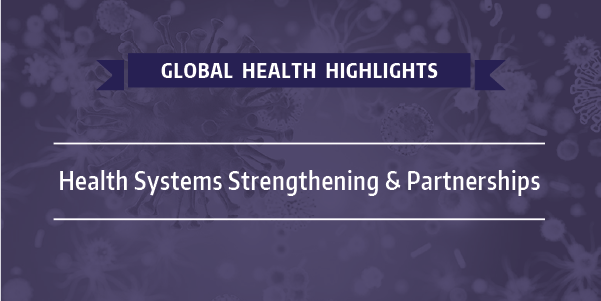Achieving health for all globally requires developing sustainable health systems locally. To support this vision, the Department of Global Health (DGH) regularly partners with Ministries of Health, academic institutions, and non-profit organizations worldwide to strengthen systems, optimize policies, and implement solutions that promote population health.
Below, we’re highlighting two DGH centers actively working with global partners to improve the quality of locally-led public health initiatives and outcomes.
Reducing Maternal Mortality in Puntland, Somalia
Following decades of conflict, Somalia is experiencing some of the most pressing public health challenges in the world including a maternal mortality ratio (MMR) of 732 deaths/100,000 live births. In 2010, UNICEF estimated that one in 14 pregnancies ended with a maternal death. To reduce maternal mortality, Somalia ministries of health rolled out the Marwo Caafimaad Program in 2012. The program recruits community-based female health workers who can provide pregnant mothers with health education, screening for high risk to prevent obstetric deaths, and referrals to local health facilities.
A collaborative consortium that includes UW Department of Global Health faculty, the King County-based Somali Health Board, the Puntland Ministry of Health, and Health Alliance International (HAI) is currently conducting formative research on the Marwo Caafimaad program in Puntland, Somalia. Funded by the UW Population Health Initiative, the ultimate objective of this research project is to assist the Puntland Ministry of Health to design a culturally-appropriate intervention to strengthen the Marwo Caafimaad program and reduce maternal mortality and improve maternal health. Because of COVID-related travel concerns, the project will conduct remote trainings for a Somalia-based research team who will collect data and participate in data analysis with the Seattle-based team. Drawing on the findings, the research teams will work closely with the Puntland Ministry of Health to design an intervention and pursue funding opportunities to support a trial of the approach in Somalia.
Generating Better Value for Money in Healthcare
In resource-constrained settings, governments must make difficult choices about which interventions and programs to prioritize in order to achieve better population health. Using tools such as economic evaluation, researchers with the Disease Control Priorities Project (DCP) help governments in low- and middle-income countries identify interventions that provide good value for money and strengthen local health systems. These analyses and recommendations are published periodically by the World Bank in the multi-volume Disease Control Priorities series.
“We try to influence the way the people in different disease communities think about priorities for health and understand how their specific innovations fit into the broader system,” said David Watkins, an assistant professor of global health and general internal medicine at UW and a series editor of the upcoming fourth edition of Disease Control Priorities. “We work across disease areas and help translate scientific evidence into policy recommendations. We want to make sure that we're producing evidence in a way that's relevant and that maximizes uptake and implementation.”
To that end, UW PhD in Implementation Science student Kristen Danforth is studying how ministries of health in Malawi and Uganda use cost-effectiveness analysis and other data in setting their agendas and prioritizing different interventions. Her study will help academic health economists tailor their analyses and recommendations to the needs and expectations of decision-makers.
In addition, the DCP team is developing new modeling tools to help ministries of health analyze the costs and consequences of different combinations of health interventions, especially for noncommunicable diseases. UW PhD in Implementation Science student Sali Ahmed is leading a project to estimate the cost of achieving universal health coverage using a model list of over 350 essential healthcare interventions.
Another project, led by Watkins and funded by the World Bank, is evaluating how policies initiated by non-health agencies impact public health. For example, what role can tobacco taxes, road safety measures, or school feeding programs play in improving health outcomes, in comparison to medical care?
“It turns out that many of a government’s most cost-beneficial options don’t lie in the hands of the health minister at all,” says Watkins. “Our analyses make the case for greater collaboration across sectors to implement policies that prevent disease and injury from ever happening in the first place.”
